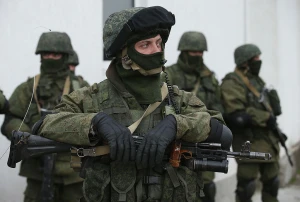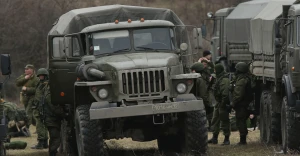
Russia has been misjudged. That is why it hinders the development of the civilized world
Civilians in the West should prepare for war with Russia
As of the current moment, the most recent statement on the inevitability of Russian military aggression comes from Rob Bauer, Chairman of the NATO Military Committee. He characterized the impending war as "comprehensive.
This is not the first forecast indicating the inevitability of World War III since the beginning of the year. Among others, Ukrainian political scientist Vadym Denysenko, author of the book "How to Destroy the Russian World," has explicitly discussed the prospect of a major conflict in the near term: "Will there be World War III? The answer is unequivocal: yes, there will be. But it will not start in 2024 for sure. As of now, it's a mix of bluster, political intrigue revolving around elections, and a competition for attention," he wrote on his Facebook page. Denysenko also emphasized, "Although Russia has taken the position of the main 'pest' in the world, today it is still weak enough to unleash a war bigger than the current one in Ukraine."
Statements about Russia's purported weakness are echoed by numerous individuals across various platforms. However, these assertions appear to be in contradiction with Rob Bauer's aforementioned statement. If Russia is genuinely as feeble as claimed, why should the civilized Western world brace itself for an all-out war? No one is anticipating any state or coalition to launch an aerial or naval attack on Russia, for instance. Neither Finland nor the NATO member states of Latvia and Estonia, bordering Russia, are likely to mount military aggression by launching armored brigades to capture St. Petersburg, for instance. On the contrary, the expectation is for military aggression to emanate from a supposedly "weak" Russia, which is depicted as deteriorating under potent sanctions, starving, and on the verge of collapse.
The conviction that Russia can be somehow restrained, put in its rightful place, and compelled to conform is underpinned by various components. However, each individual argument, or their collective force, collides with realities like a potent, stormy sea wave crashing against not even a rocky shore, but an ordinary and unyielding block of stone.
A glaring illustration of this is the acknowledgment from the Commander-in-Chief of the Ukrainian Armed Forces, Valeriy Zaluzhnyi, who openly admitted to making an error in his calculations. He genuinely believed that the significant daily losses on the battlefield would compel Russia to reconsider, halt its actions, and reflect on self-preservation. Mr. Zaluzhnyi was not alone in holding this belief; similar admissions were made by both our military and political Western allies. It appears that the Russian authorities and citizens either show minimal concern or none at all regarding the disproportionate human losses.
On a different occasion, Ukrainian diplomat Valeriy Chaly didn't just make an assumption but expressed a well-founded conviction: Russia would likely engage in a provocation against the nearest NATO country, even if it refrained from ceasing hostilities in Ukraine. "They are already itching to do so," he remarked. This assertion contradicts the equally persistent, oft-repeated notion that Russia only respects and takes heed of force. In other words, if you give Russia a significant blow, or even two, it will retreat and yield. However, as evident, we are not the sole observers of this phenomenon. Russia has been facing significant challenges daily since the commencement of the large-scale invasion. But none of them stop Russia. No developed civilized country in the Western world seems to be able to stop further aggression and prevent it. NATO is no longer an obstacle, but an irritant.
Two Soviet propaganda films, both considered landmarks for the USSR, vividly illustrate Russia's current demeanor and conduct. The first is the 1939 propaganda film "Member of the Government" (Russian "Член правительства"), concluding with a memorable monologue: "Here I stand before you, a simple Russian woman. Beaten by my husband. Frightened by popes. Shot by enemies. Yet resilient!" Following the script, this elicits applause from the audience. The second film, also thematically aligned, is the 1958 production "The Communist," where the protagonist, the lone communist in the entire village, tenaciously fells a forest alone in the rain, wielding only an axe and his bare hands, to obtain sleepers for the railroad. Subsequently, despite facing a dozen enemies, he resists death for an extended period, transforming his demise into an epic spectacle that millions of viewers were exposed to as part of the cult of death. Notably, when the film was screened in Cuba, an incident occurred in the audience during this scene: men fired assault rifles at the theater ceiling, aiming to come to the hero's aid and meet their end in a manner similar to his.
The notorious new propaganda series, "The Boy's Word," continues and modernizes these themes, asserting that "the Russian man" and the "Russian world" are indestructible due to their remarkable resilience and adaptability to adverse conditions. The series promotes the idea that cultivating brute force and adhering to one's own rules are essential for the survival and prospective success of an aggressive community. Not just during the Soviet era, but extending back to the times of Ivan the Terrible, as described by Vadym Denysenko, Russians have demonstrated an exceptionally high pain threshold. This resilience is so extensive that they cannot be intimidated by anything.
Because there is no harm that Russians have not inflicted upon themselves, and there is no limit to the sorrow they have caused to others.
Engaging in conflict with Russia appears as absurd as pursuing peace. Wars and losses do not seem to deter or halt their actions. For Russians, peace might only imply subjugation, domination, and unrestricted plunder. Vakhtang Kipiani, a historian and current member of the Ukrainian Armed Forces, cautions against dismissing Dmitry Medvedev's social media posts as the nonsensical ramblings of a ludicrous alcoholic. On the contrary, if Medvedev, a Russian politician, issues threats of an eternal war online, with the aim of reclaiming "what is theirs," such statements should be taken seriously. Medvedev indicates that the peace with Russia will essentially resemble the same war, albeit in a different dimension.
Finally, another misjudgment of the aggressor state. Several Ukrainian historians and political scientists have started predicting Russia's eventual defeat due to its incapacity to contribute anything positive to civilization. Unlike Britain and France, whose colonialist policies, despite their subjugation of captured territories in India and Africa, did bring education, medicine, and industry to those regions. Russia, however, lags behind in every aspect, offering nothing but destruction. This deficiency is posited as the reason why its wars are destined to fail and why resistance against Russia will persist. The question arises: who ever claimed or suggested that Russia genuinely desires to offer anything positive to others? Its objective seems to be destruction, akin to a frustrated child recklessly trampling on a sandcastle built by a peer on the beach, without any benefit to itself.
Is everything truly so bleak and inert? Is Russia genuinely beyond control, and will the West, forewarned of war, simply sit and wait, attempting to find an argument to compel Russia to cease its aggressive attacks? The prospect of Putin's demise, though faintly hoped for, will not alter the situation. This is partly because, for a time, Putin could be replaced by a controlled doppelgänger. Subsequently, when concealment becomes futile, another Putin may emerge, essentially the same as before. In light of this, what should civilized countries, including Ukraine, do in response?
The solution lies in acknowledging Russia's hostility and refusing to accept anything inherently Russian. While my appeal may resonate with the Ukrainian audience, similar calls should be made within Western circles: to eliminate Russian influence across all levels. Cease all engagements with Russians, even at a private level, and refrain from any dialogues with Russia. A saying grounded in reality warns, "A Russian merchant will either give everything away for free or deceive you and take it for free." Though complete isolation may allow such a vast country to sustain itself and fiercely continue its battles, renouncing efforts to pacify it would be the first conscious step toward victory, averting a larger war.
Exclusively for Espreso.
About the author: Andriy Kokotiukha, writer, screenwriter.
The editors do not always share the opinions expressed by the blog authors.
- News














































